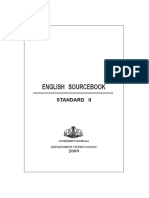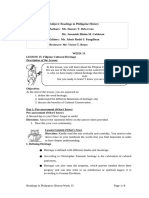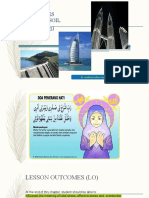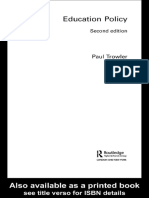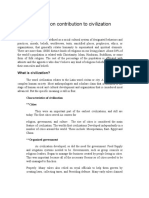Unit On Language - 2021
Uploaded by
Agus RebuffoUnit On Language - 2021
Uploaded by
Agus RebuffoThe main aim of this unit is to reflect on
the very object of our studies: Language.
We’ll address issues related to the origin
and history of the English language; the
power of language to designate and create
the world; the meaning of language across
cultures; the connection between
language, culture and identity; the
importance of studying English; the role
of the English language today.
The main thematic thread for this course
will be: Culture and Identity.
Lengua
Inglesa IV
2021
Prof. Daniela Pilar Paruzzo
Prof. Nuria V. Soler Méndez
Lengua Inglesa IV- Nivel avanzado / Introductory Unit
Welcome to this special unit in our English Language IV
program!
The main aim of this unit is to reflect on the very object of our studies:
LANGUAGE.
We’ll address issues related to the origin and history of the English
language; the power of language to designate and create the world; the
meaning of language across cultures; the connection between language,
culture and identity; the importance of studying English; the role of the
English language today.
The idea is that we pose questions, that we wonder about LANGUAGE. We
may not give final answers to our questions, but we’ll have a lot of food
for thought; thus, we’ll gain knowledge and grow.
How to work through this unit
We expect you to actively engage in the construction of knowledge
through the different activities proposed along the unit; directions and
deadlines will be posted in our Google Classroom.
You’ll have the chance to put to work all your skills: speaking, listening,
reading, writing in a variety of activities. We count on your participation
and openness to work collaboratively. Besides, throughout the unit (and
course), you’ll be responsible for keeping a journal to register your
impressions, thoughts, ideas, questions to enrich your learning. This will
become a valuable source for future activities.
N.B. As we progress in the unit, bear in mind the thematic thread of the
course: Culture and Identity.
Profesorado y Licenciatura en Inglés – Departamento de Lenguas - Facultad de Ciencias Humanas
1
Lengua Inglesa IV- Nivel avanzado / Introductory Unit
These are the icons you’ll find throughout the material to guide
your learning process:
Group work
Socialization
Journal
Homework
Questions
Important
Curiosity
Video
Website
Collaborative Virtual Activity
Book
Profesorado y Licenciatura en Inglés – Departamento de Lenguas - Facultad de Ciencias Humanas
2
Lengua Inglesa IV- Nivel avanzado / Introductory Unit
Contents
Origin of the English language. Status of the English language along
History: from minority language to lingua franca. The English we teach,
the English we learn, the English used in the world. Uses of English. The
communicational, cultural, and social relevance of the English language.
To fruitfully fulfil each of the activities proposed in this
unit, you will
a) explore and search for information about the
Important
different authors and their cultural and social contexts. Don’t forget to take notes in
your journal throughout the
b) register your answers and thoughts in your unit, in each activity!
journal.
As a warming up, we’ll reflect on the following topics.
What do you know about the English language? What is the history, the
origin of the English language? What’s the place of the English language
today? Why do people want to learn the English language?
★ Take some minutes to think about the previous triggering
questions about the English language and register your
thoughts in your journal.
★ Now, read the following quote by Heidegger and write a
personal reflection on it.
“Language is the house of being”
★ In pairs, search in the web the etymology of “language”
and “idioma.” Take notes. Remember to acknowledge
sources!
Is there any connection between your findings and Heidegger’s
quote? Justify.
Profesorado y Licenciatura en Inglés – Departamento de Lenguas - Facultad de Ciencias Humanas
3
Lengua Inglesa IV- Nivel avanzado / Introductory Unit
Journal
Don’t forget to take notes in your journal to foster reflection and
metacognition!
Collaborative Virtual Activity - PAIR WORK
★ Let’s make an intervention on the Padlet entitled LANGUAGE.
a. Paste an image that portrays your reflection on language.
b. Write a phrase that synthesizes your reflection on
language so far.
★ Watch the video Where did English come from? and write at
least two ideas, comments, thoughts triggered by the video in
your journal.
Socialization
In class, we’ll share ideas and talk about the video.
★ Draw a web on the main ideas in the video collaboratively.
★ Watch the video The History of English and write at least two
ideas, comments, thoughts triggered by the video.
Profesorado y Licenciatura en Inglés – Departamento de Lenguas - Facultad de Ciencias Humanas
4
Lengua Inglesa IV- Nivel avanzado / Introductory Unit
Homework
Remember:
★ Visit and explore the webpages of the videos we watched. YOUR REFLECTIONS AND
ANNOTATIONS ARE RICH
Don’t forget to take notes and write journal entries. MATERIAL for future class
discussions and writing
activities.
Socialization
In class, we’ll share ideas and talk about the video.
★ Draw a web on the main ideas in the video individually.
★ Read the text Native Americans by Jamake Highwater. Then
answer the questions below.
Native Americans by Jamake Highwater
Don’t forget to explore and
search for information about
When I was about five years old, I used to watch a bird in the skies of
the different authors and
southern Alberta from the Blackfeet Blood Reserve in northern Montana
their cultural and social
where I was born. I loved this bird; I would watch him for hours. He would
contexts.
glide effortlessly in that gigantic sky, or he would come down and light on
the water and float there very majestically. Sometimes when I watched
him he would creep into the grasses and waddle around not very
gracefully. We called him meksikatsi, which in the Blackfeet language
means “pink-colored feet”; meksikatsi and I became very good friends.
The bird had a very particular significance to me because I desperately
wanted to be able to fly too. I felt very much as if I was the kind of person
who had been born into a world where flight was impossible, and most of
the things that I dreamed about or read about would not be possible for
me but would be possible only for other people.
When I was ten years old, my life changed drastically. I found myself
adopted forcefully and against my parents’ will; they were considered
inadequate parents because they could not make enough money to
support me, so I found myself in that terrible position that 60 percent of
Native Americans find themselves in: living in a city that they do not
understand at all, not in another culture but between two cultures.
A teacher of the English language told me that meksikatsi was not called
meksikatsi, even though that is what my people had called that bird for
thousands of years. Meksikatsi, he said, was really “duck.” I was very
disappointed with English. I could not understand it. First of all, the bird
didn’t look like “duck,” and when it made a noise it didn’t sound like “duck,”
Profesorado y Licenciatura en Inglés – Departamento de Lenguas - Facultad de Ciencias Humanas
5
Lengua Inglesa IV- Nivel avanzado / Introductory Unit
and I was even more confused when I found out that the meaning of the
verb “to duck” came from the bird and not vice versa.
This was the beginning of a very complex lesson for me that doesn’t just
happen to black, Chicano, Jewish, and Indian children but to all children.
We are born into a cultural preconception that we call reality and that we
never question. We essentially know the world in terms of that cultural
package or preconception, and we are so unaware of it that the most
liberal of us go through life with a kind of ethnocentricity that
automatically rules out all other ways of seeing the world.
As I came to understand English better, I understood that it made a great
deal of sense, but I never forgot that meksikatsi made a different kind of
sense. I realized that languages are not just different words for the same
things but totally different concepts, totally different ways of experiencing
and looking at the world.
As artists have always known, reality depends entirely on how you see
things. I grew up in a place that was called a wilderness, but I could never
understand how that amazing ecological park could be called
“wilderness,” something wild that needs to be harnessed. Nature is some
sort of foe, some sort of adversary, in the dominant culture’s mentality.
We are not part of nature in this society; we are created above it, outside
of it, and feel that we must dominate and change it before we can be
comfortable and safe within it. I grew up in a culture that considers us
literally a part of the entire process that is called nature, to such an extent
that when Black Elk called himself the brother of the bear, he was quite
serious. In other words, Indians did not need Darwin to find out that they
were part of nature.
I saw my first wilderness, as I recall, one August day when I got off a
Greyhound bus in a city called New York. Now that struck me as being
fairly wild and pretty much out of hand. But I did not understand how the
term could be applied to the place where I was from.
Gradually, through the help of some very unusual teachers, I was able to
find my way into two cultures rather than remain helplessly between two
cultures. The earth is such an important symbol to most primal people
that when we use European languages, we tend to capitalize the E in much
the same way that the word God is capitalized by people in the dominant
culture. You can imagine my distress when I was ten years old to find out
that synonyms for the word earth—dirt and soil—were used to describe
uncleanliness on the one hand and obscenity on the other. I could not
possibly understand how something that could be dirty could have any
kind of negative connotations. It would be like saying the person is godly,
so don’t go near him, and I could not grasp how these ideas made their
way into the English language.
Profesorado y Licenciatura en Inglés – Departamento de Lenguas - Facultad de Ciencias Humanas
6
Lengua Inglesa IV- Nivel avanzado / Introductory Unit
Some questions to think further.
1. Why did the duck have a special significance for Jamake Highwater
when he was very young?
2. What drastic change occurred when he was ten years old? Why did he
describe himself then as "not in another culture but between two
cultures"?
3. Can you give an example of ethnocentricity that you have seen? Do you
think that some people are more ethnocentric than others? Why?
4. Why didn't the author like the word duck? What are some English words
that have surprised or displeased you? Explain.
5. According to Highwater, what difference is there between Native
American Indians and the dominant American culture with regard to
nature?
6. Do you know who Charles Darwin is? (If not, how can you find out?) Why
does the author say that the Indians did not need him?
7. Why would it bother the author that in English obscene words and jokes You might want to do some
are often referred to as "dirty" words and jokes? They are also sometimes research about other
aboriginal languages in the
called "off-color." In some cultures, obscene jokes are referred to as world and their relationship
"green stories." Is there any color associated with them in your culture? with other languages.
How are they referred to? The more you know, the
more you grow!
8. Was the author's attitude negative or positive toward English when he
first started to learn it? Why? What part of the selection tells us that his
attitude changed later? Why do you think that it changed?
Source: Mosaic 2 Reading (2002-4th edition) Wegmann, Brenda, et all-
McGraw-Hill Contemporary. pp. 4-6.
★ Read the following fragment from Gloria Anzaldúa’s
Borderlands/La Frontera: The New Mestiza (1987). “How to
Tame a Wild Tongue” (Excerpt, pp. 52-64.) And think about the
following:
Profesorado y Licenciatura en Inglés – Departamento de Lenguas - Facultad de Ciencias Humanas
7
Lengua Inglesa IV- Nivel avanzado / Introductory Unit
What does the writer say about language? What’s the connection she
establishes between language and identity? Do you agree with her views?
Why/not?
If a person, Chicana or Latina, has a low estimation of my native
tongue, she also has a low estimation of me. Often with mexicanas y
latinas we'll speak English as a neutral language. Even among
Chicanas we tend to speak English at parties or conferences. Yet, at
the same time, we're afraid the other will think we're agringadas
because we don't speak Chicano Spanish. We oppress each other
trying to out-Chicano each other, vying to be the "real" Chicanas, to
speak like Chicanos. There is no one Chicano language just as there
Borderlands/La
is no one Chicano experience. A monolingual Chicana whose first Frontera: The
language is English or Spanish is just as much a Chicana as one who New Mestiza
speaks several variants of Spanish. A Chicana from Michigan or (1987) a semi-
Chicago or Detroit is just as much a Chicana as one from the autobiographical
Southwest. Chicano Spanish is as diverse linguistically as it is collection of
regionally. prose and
poetry.
By the end of this century, Spanish speakers will comprise the biggest
minority group in the U.S., a country where students in high schools
and colleges are encouraged to take French classes because French
is considered more "cultured." But for a language to remain alive it
must be used. By the end of this century English, and not Spanish, will
be the mother tongue of most Chicanos and Latinos.
***
So, if you want to really hurt me, talk badly about my language. Ethnic
identity is twin skin to linguistic identity - I am my language. Until I can
take pride in my language, I cannot take pride in myself. Until I can
accept as legitimate Chicano Texas Spanish, Tex-Mex, and all the
other languages I speak, I cannot accept the legitimacy of myself. Until
I am free to write bilingually and to switch codes without having
always to translate, while I still have to speak English or Spanish when
I would rather speak spanglish, and as long as I have to accommodate
the English speakers rather than having them accommodate me, my
tongue will be illegitimate.
I will no longer be made to feel ashamed of existing. I will have my
voice: Indian, Spanish, white. I will have my serpent's tongue -- my
woman's voice, my sexual voice, my poet's voice. I will overcome the
tradition of silence.
★ Can you establish any connection between Highwater’s and
Anzaldúa’s views? Write a journal entry on this.
Profesorado y Licenciatura en Inglés – Departamento de Lenguas - Facultad de Ciencias Humanas
8
Lengua Inglesa IV- Nivel avanzado / Introductory Unit
Collaborative Virtual Activity - INDIVIDUAL
★ Revisit the Padlet entitled LANGUAGE. Read all the posts on
it. Has your view on language changed? Why/not? Post a new
comment referring to your view on language.
Now, we are going to focus on the learning of the English language. To
reflect on the reasons to learn English and its implications worldwide, we’ll
listen to two TED Talks.
Journal
Don’t forget to take notes in your journal to foster reflection and
metacognition!
★ Watch the video Don't insist on English! by Patricia Ryan and
take notes underscoring main ideas and the speaker’s view on
the English language.
★ Watch the video The world's English mania by Jay Walker and
take notes underlining the main ideas and the speaker’s view
on the English language.
Profesorado y Licenciatura en Inglés – Departamento de Lenguas - Facultad de Ciencias Humanas
9
Lengua Inglesa IV- Nivel avanzado / Introductory Unit
★ After watching the videos do the following activities in pairs:
a. choose one of the videos and draw a web on the main
ideas presented in it.
b. write questions to pose to the speakers in each talk.
c. think of counterarguments to the ideas presented by
each speaker.
Homework
★ Choose an aspect about the English language discussed in
this unit to deepen your knowledge and then create a three-
minute video. Be creative!
Some steps to consider for the completion of this task:
● Review your notes taken along the unit.
● Revisit your journal entries.
● Choose the aspect you want to present.
● Draw an outline for your speech. Mind considering
introduction, development, and conclusion in the oral delivery.
● Mind you give sound and enough support for the ideas
presented.
● Enrich your video with images, music, etc. connected to your
speech.
Profesorado y Licenciatura en Inglés – Departamento de Lenguas - Facultad de Ciencias Humanas
10
You might also like
- Raising A Bilingual Child: A step-by-step guide for parentsFrom EverandRaising A Bilingual Child: A step-by-step guide for parents4.5/5 (2)
- Week2 Slides Understanding Bilingualism 1No ratings yetWeek2 Slides Understanding Bilingualism 145 pages
- Filipino Author During The Japanese Occupation - Manuel ArguillaNo ratings yetFilipino Author During The Japanese Occupation - Manuel Arguilla24 pages
- Classroom Orientation: EL 103 Ms. Angelica JimenezNo ratings yetClassroom Orientation: EL 103 Ms. Angelica Jimenez39 pages
- URSOLINO - JAY - LESTER - D. - BEED-1 - Activity 2100% (1)URSOLINO - JAY - LESTER - D. - BEED-1 - Activity 28 pages
- GEPC Module 3 Varieties and Registers of LanguageNo ratings yetGEPC Module 3 Varieties and Registers of Language13 pages
- Rigoberto Alejandro Hernandez Hernandez - Language & Culture Questionnaire & Pre Self-AssessmentNo ratings yetRigoberto Alejandro Hernandez Hernandez - Language & Culture Questionnaire & Pre Self-Assessment5 pages
- Pca-English - 3RD Bgu (1) PlanificacionesNo ratings yetPca-English - 3RD Bgu (1) Planificaciones16 pages
- DLP About Integration of Others Subject Part 2No ratings yetDLP About Integration of Others Subject Part 25 pages
- Kalayaan Christian School: United Church of Christ in The PhilippinesNo ratings yetKalayaan Christian School: United Church of Christ in The Philippines4 pages
- Cot Lesson Plan Fouth Quarter The Parable of The Rainbow Color June 2022No ratings yetCot Lesson Plan Fouth Quarter The Parable of The Rainbow Color June 20226 pages
- Syntax, An Introduction: Form, Meaning and Use: I Wayan Arka Yana QomarianaNo ratings yetSyntax, An Introduction: Form, Meaning and Use: I Wayan Arka Yana Qomariana45 pages
- Panorama Introducción a La Lengua Española 5th Edition PDFNo ratings yetPanorama Introducción a La Lengua Española 5th Edition PDF12 pages
- DAILY LESSON LOG English Samaria and Nazareth 2018-2019 - For MergeNo ratings yetDAILY LESSON LOG English Samaria and Nazareth 2018-2019 - For Merge5 pages
- Unit I Title: World Englishes and Global CommunicationNo ratings yetUnit I Title: World Englishes and Global Communication7 pages
- 1 English Pedagogy free notes by Himanshi Singh100% (1)1 English Pedagogy free notes by Himanshi Singh9 pages
- Peace Corps Uzbek Language Competencies PDFNo ratings yetPeace Corps Uzbek Language Competencies PDF214 pages
- Learning Plan ELEMENTARY Title of Lesson Grade Level: Citizenship and Community LifeNo ratings yetLearning Plan ELEMENTARY Title of Lesson Grade Level: Citizenship and Community Life9 pages
- English Grade X Learning Activity Sheet Module 4 Lesson 1.1100% (1)English Grade X Learning Activity Sheet Module 4 Lesson 1.17 pages
- Sílabo: Área Curricular Grado Docente AñoNo ratings yetSílabo: Área Curricular Grado Docente Año3 pages
- 3-Dimensional Drawings, or Photographic or Pictorial Drawings. Isometric DrawingNo ratings yet3-Dimensional Drawings, or Photographic or Pictorial Drawings. Isometric Drawing32 pages
- Stakeholder Analysis Matrix (3.3.2) (10.1)No ratings yetStakeholder Analysis Matrix (3.3.2) (10.1)1 page
- DBM CSC Form No. 1 Position Description Forms BlankNo ratings yetDBM CSC Form No. 1 Position Description Forms Blank1 page
- Relationship Between Cognitive Dissonance and Achievement in Mathematics Among Higher Secondary School StudentsNo ratings yetRelationship Between Cognitive Dissonance and Achievement in Mathematics Among Higher Secondary School Students5 pages
- ECG353-chapter 2 - Vertical Stress Distribution - Part 2No ratings yetECG353-chapter 2 - Vertical Stress Distribution - Part 221 pages
- ALGEBRAIC EXPRESSIONS Term 2 Lesson 7 Grade 8No ratings yetALGEBRAIC EXPRESSIONS Term 2 Lesson 7 Grade 85 pages
- Aims and Objectives - What's The Difference?: June 9, 2014 Pat ThomsonNo ratings yetAims and Objectives - What's The Difference?: June 9, 2014 Pat Thomson2 pages
- Mental Models: An Interdisciplinary Synthesis of Theory and MethodsNo ratings yetMental Models: An Interdisciplinary Synthesis of Theory and Methods13 pages
- CFD Modeling and Approaches For Calculating The Losses of A Subsea Pipeline Transporting HighPressurized FluidNo ratings yetCFD Modeling and Approaches For Calculating The Losses of A Subsea Pipeline Transporting HighPressurized Fluid7 pages
- Aristophanes: Clouds, Women at The Thesmophoria, Frogs: A Verse Translation, With Introduction and Notes 1st Edition Stephen Halliwell100% (5)Aristophanes: Clouds, Women at The Thesmophoria, Frogs: A Verse Translation, With Introduction and Notes 1st Edition Stephen Halliwell62 pages
- Religion's Contribution To Civilization-1No ratings yetReligion's Contribution To Civilization-112 pages
- Advances in Adaptive Control Theory GradNo ratings yetAdvances in Adaptive Control Theory Grad165 pages
- Owner's Manual: Gas-Fired Infra-Red Heater Models: SHR35, 50, 75 & 100-X/N/L-1No ratings yetOwner's Manual: Gas-Fired Infra-Red Heater Models: SHR35, 50, 75 & 100-X/N/L-117 pages
- African Daisy Orange: Dimorpotheca Greek Dis (Twice) + Morphe (Shape) + Theka (A Fruit)No ratings yetAfrican Daisy Orange: Dimorpotheca Greek Dis (Twice) + Morphe (Shape) + Theka (A Fruit)11 pages
- Dell PowerEdge R730 and R730xd Technical Guide v1 7 CompressedNo ratings yetDell PowerEdge R730 and R730xd Technical Guide v1 7 Compressed66 pages
- Raising A Bilingual Child: A step-by-step guide for parentsFrom EverandRaising A Bilingual Child: A step-by-step guide for parents
- Filipino Author During The Japanese Occupation - Manuel ArguillaFilipino Author During The Japanese Occupation - Manuel Arguilla
- Classroom Orientation: EL 103 Ms. Angelica JimenezClassroom Orientation: EL 103 Ms. Angelica Jimenez
- URSOLINO - JAY - LESTER - D. - BEED-1 - Activity 2URSOLINO - JAY - LESTER - D. - BEED-1 - Activity 2
- Rigoberto Alejandro Hernandez Hernandez - Language & Culture Questionnaire & Pre Self-AssessmentRigoberto Alejandro Hernandez Hernandez - Language & Culture Questionnaire & Pre Self-Assessment
- Kalayaan Christian School: United Church of Christ in The PhilippinesKalayaan Christian School: United Church of Christ in The Philippines
- Cot Lesson Plan Fouth Quarter The Parable of The Rainbow Color June 2022Cot Lesson Plan Fouth Quarter The Parable of The Rainbow Color June 2022
- Syntax, An Introduction: Form, Meaning and Use: I Wayan Arka Yana QomarianaSyntax, An Introduction: Form, Meaning and Use: I Wayan Arka Yana Qomariana
- Panorama Introducción a La Lengua Española 5th Edition PDFPanorama Introducción a La Lengua Española 5th Edition PDF
- DAILY LESSON LOG English Samaria and Nazareth 2018-2019 - For MergeDAILY LESSON LOG English Samaria and Nazareth 2018-2019 - For Merge
- Unit I Title: World Englishes and Global CommunicationUnit I Title: World Englishes and Global Communication
- Learning Plan ELEMENTARY Title of Lesson Grade Level: Citizenship and Community LifeLearning Plan ELEMENTARY Title of Lesson Grade Level: Citizenship and Community Life
- English Grade X Learning Activity Sheet Module 4 Lesson 1.1English Grade X Learning Activity Sheet Module 4 Lesson 1.1
- 3-Dimensional Drawings, or Photographic or Pictorial Drawings. Isometric Drawing3-Dimensional Drawings, or Photographic or Pictorial Drawings. Isometric Drawing
- DBM CSC Form No. 1 Position Description Forms BlankDBM CSC Form No. 1 Position Description Forms Blank
- Relationship Between Cognitive Dissonance and Achievement in Mathematics Among Higher Secondary School StudentsRelationship Between Cognitive Dissonance and Achievement in Mathematics Among Higher Secondary School Students
- ECG353-chapter 2 - Vertical Stress Distribution - Part 2ECG353-chapter 2 - Vertical Stress Distribution - Part 2
- Aims and Objectives - What's The Difference?: June 9, 2014 Pat ThomsonAims and Objectives - What's The Difference?: June 9, 2014 Pat Thomson
- Mental Models: An Interdisciplinary Synthesis of Theory and MethodsMental Models: An Interdisciplinary Synthesis of Theory and Methods
- CFD Modeling and Approaches For Calculating The Losses of A Subsea Pipeline Transporting HighPressurized FluidCFD Modeling and Approaches For Calculating The Losses of A Subsea Pipeline Transporting HighPressurized Fluid
- Aristophanes: Clouds, Women at The Thesmophoria, Frogs: A Verse Translation, With Introduction and Notes 1st Edition Stephen HalliwellAristophanes: Clouds, Women at The Thesmophoria, Frogs: A Verse Translation, With Introduction and Notes 1st Edition Stephen Halliwell
- Owner's Manual: Gas-Fired Infra-Red Heater Models: SHR35, 50, 75 & 100-X/N/L-1Owner's Manual: Gas-Fired Infra-Red Heater Models: SHR35, 50, 75 & 100-X/N/L-1
- African Daisy Orange: Dimorpotheca Greek Dis (Twice) + Morphe (Shape) + Theka (A Fruit)African Daisy Orange: Dimorpotheca Greek Dis (Twice) + Morphe (Shape) + Theka (A Fruit)
- Dell PowerEdge R730 and R730xd Technical Guide v1 7 CompressedDell PowerEdge R730 and R730xd Technical Guide v1 7 Compressed














































